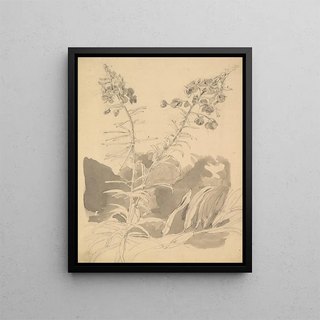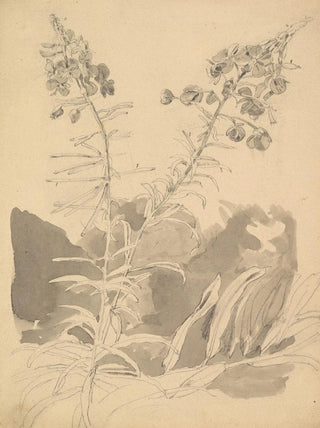Painting Study of a Epilobe - Carl Gustav Carus | Art print


View from behind

Frame (optional)
In the fascinating world of art, some works stand out for their ability to capture the very essence of nature. "Study of an Epilobe - Carl Gustav Carus" is one of those pieces that, through its elegance and delicacy, invites the viewer to a profound contemplation. This artwork, which depicts a botanical study of an epilobe, testifies to Carus's skill in blending science and art. By showcasing the intrinsic beauty of this plant, the artist offers us a window into a world where nature and harmony meet, encouraging us to explore the subtleties of forms and colors.
Style and uniqueness of the work
Carl Gustav Carus's work is characterized by a meticulous and detailed style, where each stroke seems to be the result of careful observation. In "Study of an Epilobe," the plant is depicted with remarkable precision, with each petal and leaf rendered with a finesse that reflects an in-depth knowledge of botany. This attention to detail, combined with a palette of soft and natural colors, creates a serene and soothing atmosphere. The composition, both simple and elegant, allows the viewer to focus on the beauty of the epilobe, while awakening a sense of curiosity about the life surrounding it. Carus does not merely depict the plant; he manages to infuse a soul into his subject, transforming a simple botanical study into a true work of art.
The artist and his influence
Carl Gustav Carus, an emblematic figure of German Romanticism, knew how to marry his passions for art and science throughout his career. As a doctor and naturalist, he was always fascinated by the mysteries of nature, which is reflected in his works. His unique approach, combining scientific observation and artistic sensitivity, influenced many artists of his time and beyond. Carus also played an important role in the development of landscape and botanical painting, paving the way for a new appreciation of nature in art. His legacy endures, and works such as "Study of an Epilobe" continue to inspire.

Matte finish

View from behind

Frame (optional)
In the fascinating world of art, some works stand out for their ability to capture the very essence of nature. "Study of an Epilobe - Carl Gustav Carus" is one of those pieces that, through its elegance and delicacy, invites the viewer to a profound contemplation. This artwork, which depicts a botanical study of an epilobe, testifies to Carus's skill in blending science and art. By showcasing the intrinsic beauty of this plant, the artist offers us a window into a world where nature and harmony meet, encouraging us to explore the subtleties of forms and colors.
Style and uniqueness of the work
Carl Gustav Carus's work is characterized by a meticulous and detailed style, where each stroke seems to be the result of careful observation. In "Study of an Epilobe," the plant is depicted with remarkable precision, with each petal and leaf rendered with a finesse that reflects an in-depth knowledge of botany. This attention to detail, combined with a palette of soft and natural colors, creates a serene and soothing atmosphere. The composition, both simple and elegant, allows the viewer to focus on the beauty of the epilobe, while awakening a sense of curiosity about the life surrounding it. Carus does not merely depict the plant; he manages to infuse a soul into his subject, transforming a simple botanical study into a true work of art.
The artist and his influence
Carl Gustav Carus, an emblematic figure of German Romanticism, knew how to marry his passions for art and science throughout his career. As a doctor and naturalist, he was always fascinated by the mysteries of nature, which is reflected in his works. His unique approach, combining scientific observation and artistic sensitivity, influenced many artists of his time and beyond. Carus also played an important role in the development of landscape and botanical painting, paving the way for a new appreciation of nature in art. His legacy endures, and works such as "Study of an Epilobe" continue to inspire.
12,34 €






